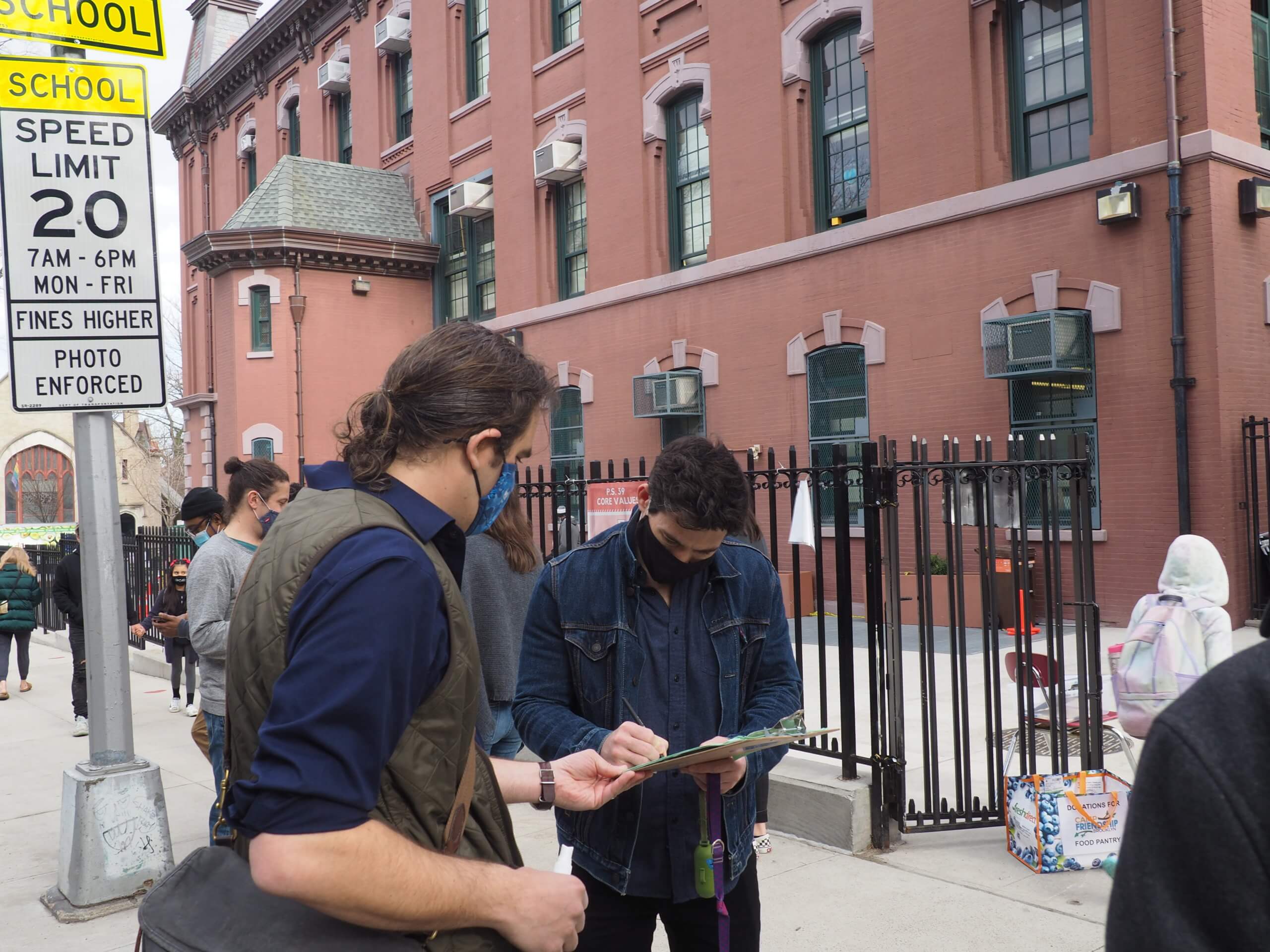As a line of mask-wearing Brooklynites waited outside the Park Slope CityMD on Friday, would-be politico Justin Krebs hustled through the waiting crowd, collecting petitioning signatures for his nascent City Council bid.
After earning a signature from a registered voter, Krebs faced a few rejections — including from one man who told him curtly to “stop talking to me,” and another from a rubber-gloved man who shooed him away for “distance.”
Making the rounds, Krebs secured three signatures from around a dozen line-waiters, marking a below-average showing according to the candidate.
“I’ve done this line before and I’ve probably got positive engagement from about half,” said the candidate vying for the 39th Council District. “It’s always interesting.”

The rules of the (petitioning) road
The many political hopefuls running for city office and their supporters have been pounding the pavement since early March, donning double masks and gloves while wielding clipboards and hand sanitizer to collect hundreds of signatures they need to qualify for the June 22 primary ballot.
In order for their name to appear on voting cards, all candidates must have at least 270 petitions signed by residents of their district who are registered members of their party. Petitioning officially began on March 2, and they have to file the collection of John Hancocks with the state’s Board of Elections between March 22 and March 25, according to state election law.
Prior to petitioning season, more than 100 candidates and their allies called on Gov. Andrew Cuomo to scrap the requirements entirely this year, saying the practice would risk further spreading the coronavirus — but state legislators eventually agreed to lowering the requirements to just 30 percent while shortening the timeframe to about three weeks.
Campaigns usually try to gather well above the minimum in case the petitions are challenged in court by their opponents for not meeting a complex set of requirements to be valid.
Such was the case during the Council election in Bushwick’s 37th District last year when an appeals court booted all-but-one candidate off the Democratic primary ballot over signature issues, effectively allowing now-Councilmember Darma Diaz to run unopposed in the primary and the general election in the heavily-blue precinct.
‘An opportunity to connect with people’
For some, petitioning has been their first chance to campaign in-person during the pandemic, allowing politicos to speak with everyday voters who may not be the type to attend campaign Zoom events.
“Anybody who comes to a Zoom and asks a question has already thought about it a lot, and that’s great, those folks are intentional and thoughtful,” said Krebs. “But when you stop someone on the street and say ‘I’m running for City Council’ and they say ‘what are you going to do about dog poop?’ They’re not coming to a Zoom to ask that question, that’s an honest reaction.”
In the 34th Council District in Williamsburg and Bushwick, candidate Jennifer Gutiérrez has also been happy to reconnect with locals at parks and outside grocery stores, after a year of virtual gatherings and organizing.
“There’s a ton of people in the community I haven’t seen all year,” Gutiérrez said. “It’s really been an opportunity to connect with people, to check to see if people are alive unfortunately.”
‘Putting our lives at risk’
Health concerns remain, as evidenced when 33rd Council Candidate Lincoln Restler tested positive for the virus after the first week of petitioning.
It’s another reminder why it's irresponsible for the Governor to have forced campaigns to petition during a pandemic – even if you take all precautions, wear an N95 mask, like I did, and are primarily outdoors – it’s still a risk.
— Lincoln Restler (@LincolnRestler) March 11, 2021
“It’s another reminder why it’s irresponsible for the Governor to have forced campaigns to petition during a pandemic — even if you take all precautions, wear an N95 mask, like I did, and are primarily outdoors — it’s still a risk,” Restler wrote on Twitter.
In neighboring Fort Greene’s 35th Council District, candidate Renee Collymore slammed the government, saying it was irresponsible to force candidates and their supporters to put themselves and the public in danger of catching Covid.
“It is very dangerous because you have to approach people and you’re up and them and they’re up on you,” said Collymore. “We are out there putting our lives at risk — there’s a pandemic going on.”
Krebs said Restler’s positive test hammered home the inherent risk of petitioning in person, and made his campaign reconsider their canvassing strategy moving forward.
“However he got it is a reminder that getting Covid is a real and present danger,” he said. “It made us say about canvasses we had planned this weekend, ‘if our numbers are good enough, we don’t have to ask people to do that again.’”
Candidate for Coney Island’s 47th District, Ari Kagan, said he’s been extra careful after he contracted a mild case of COVID-19 in early January, advising his team to only collect signatures as long as they and the people they’re interacting with feel safe.
“I tell my volunteers, ‘If somebody doesn’t want to open the door, don’t push them, if you feel unsafe, don’t collect [petitions],” said Kagan.





















